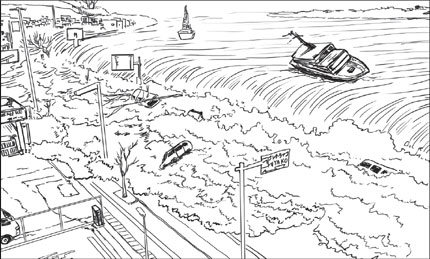Flotsam and jetsam in disaster are testament to our frailty
|
|
|
[By Zhou Tao/Shanghai Daily] |
The devastating earthquake and tsunami that struck Japan's northeast coast, and the ensuing menace of a nuclear meltdown had grabbed the headlines for well over a week.
Now that pride of place is given to the missiles raining down on Libya. That's a largely a tribal state with a lot of desert, but like Iraq, it is fatally rich in oil.
Just as God moves in mysterious ways, arrogant Western powers fire their overstocked missiles in predictable ways, exercising much prudence in the choice of their target. They are very obvious when deprived of their fine trappings of democracy and humanity. That's why it is much more worthwhile to analyze the disaster in Japan.
Most Chinese were first impressed by the strong sense of discipline and composure the Japanese have demonstrated in the face of a quake of this magnitude.
For instance, Saturday's Xinmin Evening News reported of a Chinese tourist stuck in a five-hour traffic jam on a highway from Tokyo on March 11, the day when the temblor hit. "For over five hours I had not heard any motorists blaring their horns or making loud noises, nor seen anyone getting out to smoke or anyone trying to jump the queue," the Chinese tourist was quoted as saying.
There has been extensive Chinese press coverage of how ordinary Japanese cope with the disaster and keep stiff upper lips, of how Japanese media chose not to sentimentalize scenes of distress by showing people in tears or hysteria - as any Chinese media professionals (particularly TV) would not fail to do in a similar situation.
The sense of solidarity, discipline and order is exemplary for Chinese and the rest of the world.
Best-laid plans
But all this pales into insignificance in the face of the natural power that wrought the damages, and thwarted the best-laid human plans.
There have been many reports saying that Japan, as a rich country accustomed to seismic rumblings, is famous for its disaster preparedness. But in another sense, its highly modernized infrastructure might also have aggravated the distress.
As mobiles phones are such a convenient means of communication, we can imagine the sense of panic and helplessness when people found their phones useless soon after the quake. The situation was much similar in the Wenchuan quake in Sichuan Province in May 2008.
Almost immediately after the quake in Japan, motorized vehicles were also rendered immobile after roads were destroyed. This seriously affected the supply of food, water, and heat. So some of the richest people in the world were actually having difficulty feeding themselves and keeping themselves warm.
In our brave new world, sensitivity to whether one has adequate food and clothing used to be a litmus test of poverty.
Oil-dependent
In some developed countries obesity is increasingly seen as a sign of wretchedness, because these people are presumably unable to afford a workout in a gym. Unfortunately, in all these countries procurement of food and other vital resources is dependent on oil and roads, which turn out to be undependable. Modern infrastructure fuels a deceptive sense of security.
It is reported that 40 percent of Japan's 35,000-kilometer coastline is lined with concrete seawalls, breakwaters and other structures designed to protect against tsunamis and other disasters.
In Kamaishi, the world's largest seawall was completed in 2009 at a cost of US$1.5 billion. At 63 meters, it was touted the world's highest, and entered the Guinness Book of World Records. When the tsunami hit on March 11, the waves easily crashed over these walls, carrying with them houses, boats, and cars, as if they were toys.
After the water subsided, we saw gigantic boats anchored on top of houses, or stranded on the streets. More tragic, when the tsunami washed over the seawalls erected to protect the Daiichi and Daini nuclear power plants in Fukushima, it doused the diesel generators that maintained the cooling system, leading to the worst nuclear crisis in recent memory.
In these ambitious public works intended to conquer nature, we see how confidence in technology becomes hubris of ignorance. As Robert Burns mused in his "To a Mouse, on Turning Her Up in Her Nest with the Plough,"
"The best laid schemes of mice and men
Go often askew,
And leave us nothing but grief and pain,
For promised joy!"
The debris, flotsam and jetsam that flowed on the waves reminded us less of human greatness, than of the fragility of the elements of our civilization - plastic, concrete and steel.
That said, I still agree that Japan's superb preparedness probably limited the extent of the catastrophe. I sometimes wonder what would happen to us in a similar situation.
Yes, we are lucky to be located on a continent not known for its seismic activity, but that's almost the only consolation we have. And remember: God moves in mysterious ways. Our building codes and standards are markedly lower than those in Japan, even though we Chinese are no sticklers for published codes and standards.
Late last year, Kang Rixin, former head of the China National Nuclear Corp, was sentenced to life imprisonment for accepting about US$1 million in bribes. What are the trade-offs for these bribes?
In a nuclear power "great leap forward" that we are still witnessing, we have lined our east coast with nuclear plants, and the total capacity under construction is double the capacity now in operation.
Although China has suspended approval of new nuclear plants and made breakthroughs in nuclear technology, we can't be too cautious.
Professor Benjamin K. Sovacool from National University of Singapore wrote recently: "Advocates of nuclear energy have made considerable political headway around the world in recent years, touting it as a safe, clean, and reliable alternative to fossil fuels."
 0
0 








Go to Forum >>0 Comments